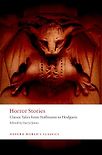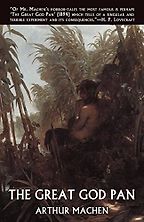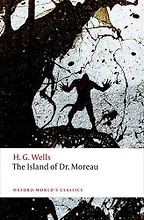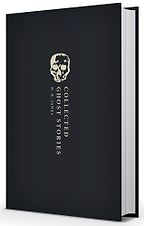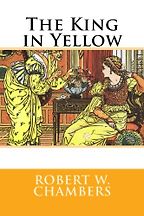What is ‘horror’?
Horror is any form of art—and I think we have to understand it as art—that sets out to horrify, to frighten, to shock, and occasionally to disgust. In other words, one of the distinctive features of horror is that it is a cultural and aesthetic form that is meant to produce a visceral physical reaction.
There aren’t many art forms that deliberately set out to make you puke. Yet certain kinds of horror do. That is maybe not a very exalted aesthetic aim, but it is an aesthetic aim. This is horror in its most gross form.
As a cultural form that is intended to shock, horror could be classed as a variety of avant-garde art. One of the functions of the avant-garde is to shock us into a sense of the limits of our own tolerance, including our tolerance for what is art. Horror books or films are often rejected as rubbish. They can provoke outraged responses: the urge to ban, to censor, to control.
So horror is first of all an aesthetic form with physical effects. But I think it is also an externalisation of prevalent cultural anxieties.
Can you give some examples?
One of the best places to look for examples is late-Victorian England. Think of 1897, the year of the Diamond Jubilee of Queen Victoria, which marks the zenith of the British Empire.
1897 also saw the publication of a number of landmark works which were very anxious about the status and lasting power of the British Empire. These works often envisage colonial or intergalactic Others coming to invade London, the imperial metropolis. London gets invaded, London gets destroyed.
“The publication of Charles Darwin’s On the Origin of Species in 1859 was of enormous significance. It is difficult to overestimate the kind of psychic and cultural change that it brought about”
Along with Bram Stoker’s Dracula, we might mention Richard Marsh’s The Beetle, an Egytptomaniac novel in which an ancient Egyptian mummy comes back to wreak its revenge. H. G. Wells’s The War of the Worlds was published in serial form in the same year.
There was a whole range of such extraordinarily anxious texts in which empire is understood as permeable, vulnerable, open to disease, open to invasion. Horror often works as a way of figuring and externalising these kinds of cultural anxieties.
You have previously described horror as a ‘phobic cultural form’. As well as provoking a physical reaction in the reader, can horror be understood as a phobic reaction to modernity?
I think it can. You could see horror as a reaction to the massive industrialisation and urbanisation that occurred throughout the nineteenth century. By the end of this century, London was incomparably the largest city in the history of the world. There were slums and poverty, and a vastly expanding population.
Modernity could be terrifying. Modern forces could seem demonic: there was the idea of a dangerous and uncontrollable mob, and of the city growing to an extent where it becomes incomprehensible.
“Horror often works as a way of figuring and externalising cultural anxieties”
Horror could also be seen as a reaction to secularisation. In this context, the publication of Charles Darwin’s On the Origin of Species in 1859 was of enormous significance. It is difficult to overestimate the kind of psychic and cultural change that it brought about.
On the one hand, the Origin of Species produced a crisis of faith, which T H Huxley described with the new word ‘agnosticism’. But more interestingly, it led to the rejuvenation of an interest in the supernatural, and particularly spiritualism. The great age of spiritualism was from the 1870s onwards. Roger Luckhurst has written a splendid book called The Invention of Telepathy on this very subject.
Your first book choice, Arthur Machen’s The Great God Pan (1894), is very interested in spiritualism.
Yes, it was written at a time when there was a great interest in spiritualism, in another world or an afterlife. There was a sense that material reality—the material reality that was the stuff of the enlightenment and of industrial capitalism—is not all that there is.
Strictly, The Great God Pan should be described as an occult rather than a spiritualist novel. However, it does use the language of spiritualism. The image that Arthur Machen uses is that of tearing aside the veil. If only you could tear aside the veil, you would find whole other vistas of reality.
Machen probably did genuinely believe that the world beyond the veil interpenetrated with our world. One of the remarkable things about his novel is how it manages to unite the worlds of scientific materialism and of occult spiritualism.
In The Great God Pan, the vehicle of witnessing the Great God is an unethical vivisection. It starts with a kind of brain surgery or trepanning operation. The character Mary gets to see the Great God Pan, and it leaves her an idiot.
That suggests some interesting links with The Island of Doctor Moreau (1896) which is explicitly a story about vivisection.
Both emerged from a late-Victorian concern with scientific ethics. In particular, the ethics of vivisection was a very emotive and powerful political subject. A whole range of people including socialists, feminists and religious figures were united by their opposition to vivisection.
The initial audience of The Island of Doctor Moreau were horrified by it. It is a very disturbing work, soaked in pain. It is one of the archetypal mad scientist stories. However, this is not to say that it is an anti-science story.
Wells later described this story as a ‘theological grotesque’, which makes me wonder whether his target was not science, but a notion of humanity playing God. Moreau thinks of himself as a creator. The language of the Beast Men—the language that Moreau seems to have given them—is very much a Biblical language. They have a series of interdicts—‘the Law’—which sound very much like the Ten Commandments.
Wells himself was a rather gifted student of science. He studied zoology under T H Huxley at the Normal School of Science (which is now Imperial College, London). He had a degree in natural science, and made a modestly successful career for himself in the early years of the 1890s as a writer of popular science.
Doctor Moreau comes out of Wells’s engagement with T H Huxley: it is one of the great post-Darwinian novels. The last major work that Huxley wrote was a treatise called Evolution and Ethics. This was a counter-argument against social Darwinists such as Herbert Spencer who claimed that there was no connection between the impersonal material forces of science and individual human ethics. Huxley argued that this was not the case, and that scientists had to be ethical. In fact, their job was to fight against the most disturbing aspects of evolution.
So, could The Island of Doctor Moreau be seen as a response to the same ethical dilemma as The Time Machine? In the latter, Wells seems to be imagining a future scenario in which humanity has failed Huxley’s task of ethical evolution, and has degenerated into two separate species.
I think so. Wells’s visions of the future of humanity in the 1890s tended to be bleak and pessimistic. Edward Prendick, the narrator of Moreau, escapes from the island but ends up mad in London. He is revolted by humans whom he can now see only as beasts.
More generally, in John Carey’s famous phrase from The Intellectuals and Masses, Wells loved ‘getting rid of people’. He completely devastated London in The War of the Worlds. He wrote letters in which he confessed to cycling around the suburbs of London, singling out places to destroy in the most eccentric and gruesome ways.
Yet the complete destruction of humanity is also in keeping with the tenor of late-Victorian science. The second law of thermodynamics, which was formulated in the 1860s and ’70s, seemed to point towards the inevitable heat death of the sun, and thus the destruction of all left on earth.
That’s what we see at the end of The Time Machine: the destruction of the last vestiges of life under a dying sun. But even before that, we witness the biological degeneration of humanity into two distinct sub-species: the Eloi and the Morlocks.
M R James suggested that ghost stories should build to a ‘final flash or stab of horror’. What sort of horror do we find in his Collected Ghost Stories (1904)?
James, I think, is the most frightening writer I have ever encountered. It is all in the set-up. It is all in his ability to create an extraordinary, unsettling atmosphere.
James was a Cambridge don, and a manuscript scholar of enormous distinction. You have to understand his ghost stories as a by-product of his formal scholarly research.
“M R James is the most frightening writer I have ever encountered”
The bachelor dons you find in his stories were very much like James himself. They lead repressed, straightened, silent, sexless lives. In the stories, they often happen, in the course of their research in libraries or cathedrals, to unleash disturbing forces.
These forces are imperfectly or improbably realised. James has a great power of withholding the horror for as long as possible and then giving us a flash, a glimpse out of the corner of the eye. We are not sure whether we see it or not.
His ghosts or monsters are often intensely physically realised. They are often hairy or spidery. The feeling they tend to produce is disgust.
The classic example is the famous scene in ‘Casting the Runes’, in which Edward Dunning the antiquarian is alone in bed. This domestic setting is meant to signify warmth and security. He reaches under his pillow where he keeps his matches in order to light a candle. But he finds a mouth, with teeth, and with hair about it, and not the mouth of a human being. James is brilliant at such intensely realised, physical moments of horror.
James’s protagonists may be sexless dons, but is sex entirely absent from his stories?
No, it isn’t. It is easy to offer Freudian readings of James the repressed bachelor don, who was probably gay, but in an unspoken and unarticulated way.
It is certainly the case that many of the monsters and images that invoke disgust in his stories are female, or have distinctively female characteristics. For example, in ‘The Ash-Tree’, Mrs Mothersole, who was executed as a witch, returns to wreak arachnid vengeance upon the descendants of her tormentors. Again, the vagina dentata images that recur throughout his stories suggest an intense sexual anxiety.
“It is easy to offer Freudian readings of James the repressed bachelor don, who was probably gay”
However, I wouldn’t want to overstate such readings. It is worth bearing in mind that James, like a number of ghost story writers, has a very loyal readership who tend not to take kindly to these kind of suggestions.
James suggested that all ghost stories should contain three ingredients: horror, malevolence and reticence. What role does reticence play in his stories?
First and foremost, they display a narrative reticence. They are very spare, and highly formalised. The narrative frames that he employs are often deliberately narrow: much is left unsaid.
They are also politically reticent. James himself was a Tory, and the product of a certain kind of education out of which he never strayed. He went seamlessly from prep school to Eton, to King’s College Cambridge, and then back to Eton. He remained in educational establishments his entire life.
“James was described as having a brilliant but intense and narrow intellect”
A C Benson, who was James’s close friend and counterpart, described James as having a brilliant but intense and narrow intellect. This narrowness is reflected in his ghost stories, which display little interest in class. Nor is there a sense of Britain as an imperial power.
While James’s ghost stories are reticent, Bram Stoker’s Dracula (1897) is more capacious.
Absolutely. James disliked Dracula for its excess. He said that in Stoker’s book, ‘the butter is spread far too thick’.
Despite this negative judgment, doesn’t Dracula have to be regarded as one of the greatest works of horror?
I think it does. In 1983, A N Wilson published an edition of Dracula, in which he essentially judged that it wasn’t any good. I think we have moved beyond that.
Nevertheless, it is difficult to evaluate Stoker as a writer. Is he a great writer, whose other works have been unfairly overshadowed by Dracula? Is he a writer who produced one extraordinary masterpiece and nothing else of any value? Is he a mediocre writer who just got lucky once? I can see arguments for all these positions.
“Is Stoker a mediocre writer who just got lucky once?”
Personally, I like to read Dracula as one of the great novels of London. Stoker himself was an Irish immigrant to London. The Count is a central European immigrant to London. He initially moves to Carfax Abbey, in the suburbs, before gentrifying himself and moving to Piccadilly. In some ways, the Count is a symbolic representative of the many central and eastern European Jews who immigrated to London at this time.
Karl Marx famously used images of vampires in his writing. Can Dracula also be read as a tale about capitalism?
It can. There is an often-remarked-upon moment in which the Count is tracked down to his lair in central London. Jonathan Harker slashes at him with his kukri knife. He misses, but cuts the Count’s garments, and out pours money. It is almost as if the Count bleeds money.
This scene can be read as an allegory of exploitative class relations. Marx talks about the blood-sucking vampiric power of capital. He also explicitly talks about ‘the Wallachian boyar’, or Vlad the Impaler, as the monstrous embodiment of the oppressive power of class and capital.
Can you tell us about your last book choice, Robert Chambers’s The King in Yellow (1895)?
The King in Yellow forms part of a tradition of ‘weird fiction’. H P Lovecraft is the great embodiment of this largely American tradition, which gives us a sense of our world as a veneer, under which lie dark and monstrous forces.
The King in Yellow is interesting because it mixes a whole range of genres. It is to begin with a work of sociological future fiction, like those of H G Wells, Edward Bellamy and William Morris. It imagines America in the near future, taken over by some kind of militaristic autocracy that encourages euthanasia.
At the same time, it is a supernatural tale about a demonic book—The King in Yellow itself—the reading of which inevitably brings about madness and death. Equally, the whole thing could possibly be some kind of mad house fantasy. It is the very instability of the text that is so interesting. Where do we stand as readers? Is the narrator mad? We simply have no grounds for knowing.
Five Books aims to keep its book recommendations and interviews up to date. If you are the interviewee and would like to update your choice of books (or even just what you say about them) please email us at [email protected]
Five Books interviews are expensive to produce. If you've enjoyed this interview, please support us by donating a small amount.

